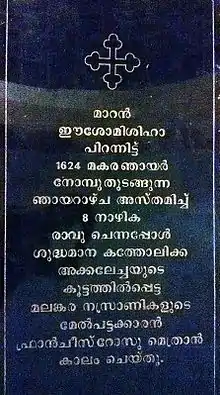Kottakkavu Mar Thoma Syro-Malabar Church, North Paravur
Kottakkavu Mar Thoma Syro-Malabar Pilgrim Church is a Syro-Malabar church located in North Paravur. According to Saint Thomas Christian tradition, the church was established in 52 AD by St. Thomas (Mar Thoma shleeha), one of the twelve apostles of Jesus Christ.[6][7] It is one of the first churches in India and is called an Apostolic Church credited to the Apostolate of St. Thomas who preached and also started conversion of people to Syriac Christianity here. It is one of the Ezharappallikal (seven Royal churches) that he established in India; the other six churches were established at Kodungalloor, Kokkamangalam, Palayoor, Kollam, Niranam, and Nilackal.[8][9]
| St.Thomas Kottakkavu Forane Church & Pilgrim Centre | |
|---|---|
 Kottakkavu Forane Church & Pilgrim Centre, North Paravur | |
| Location | North Paravur |
| Country | India |
| Denomination | Syro-Malabar Church[1] |
| History | |
| Former name(s) | Kottakkavu Kandīshāppally (Sts. Sabor and Aproth Church) - until Synod of Diamper Saints Gervasius and Protasius Church[2] |
| Founded | 52[3] |
| Founder(s) | St. Thomas the Apostle[4] |
| Dedication | St. Thomas |
| Past bishop(s) | Francisco Ros, Mar Varkey Vithayathil |
| Associated people | Saint Thomas Christians |
| Architecture | |
| Functional status | Active |
| Administration | |
| District | Ernamkulam |
| Diocese | Syro-Malabar Catholic Major Archeparchy of Ernakulam-Angamaly[5] |
| Clergy | |
| Archbishop | Mar George Alencherry (വലിയ മെത്രാപ്പോലീത്താ) |
| Bishop(s) | Andrus Thazhath (മെത്രാപ്പോലീത്ത) |
| Vicar(s) | Jose പുതിയേടത്ത് |
History
The Saint reached Kottakkayal
Where he taught the Holy Way
There within a span of a year
One thousand seven hundred
And another seventy of them
Were christened by baptism
Mar Sabor and Mar Proth
Mar Sabor and Mar Proth came from Persia to Malankara in the 9th century. They built and presided over a number of churches in Malankara operating in accordance with Saint Thomas Christians. The second church of Kottakkavu was rebuilt at this time. After their death they were remembered as saints and their name was given to this church. Kottakkavu Sliva, a Persian cross engraved on granite stone by Mar Sabor and Mar Proth, is preserved in the chapel in front of the church.
MS Vatican Syriac N. iv., dated A.D. 1556, and has the following colophon in folio 278:
"By the help of our Lord we have finished this book of the Prophets; it was written on a Monday, the 18th of February, in the year 1556 of the birth of our Lord. I, priest Jacob, the disciple of Mar Jacob, and from the village of Puraur, have written this book in the holy Church of Mar Shapur and Mar Iapot [Piruz]. May the holy name of God be praised for ever. Amen!"[10]
Old church
The existing old church, the third church, was built in 1308.[11] The ruined old church is again reconstructed in the 21st century.
Gallery
 Kottakkavu Slīva, a Persian cross founded by Mar Sabor and Mar Proth, is preserved at Kottakkavu Mar Thoma Syro-Malabar Pilgrim Center
Kottakkavu Slīva, a Persian cross founded by Mar Sabor and Mar Proth, is preserved at Kottakkavu Mar Thoma Syro-Malabar Pilgrim Center_founded_by_St._Thomas.jpg.webp) Kottakkavu Old Church
Kottakkavu Old Church Cemetery of Kottakkavu Syro-Malabar Church
Cemetery of Kottakkavu Syro-Malabar Church Tomb of Francis Roz, Metropolitan of Kodungalloor Archeparchy, inside Kottakkavu Old Church
Tomb of Francis Roz, Metropolitan of Kodungalloor Archeparchy, inside Kottakkavu Old Church Kottakkavu Pond where St. Thomas baptized Jews
Kottakkavu Pond where St. Thomas baptized Jews
References
- Shyama Rajagopal (21 September 2013). "In Paravur, a slideshow of history". Thehindu.com. Retrieved 2 July 2015.
- Whitehouse, Thomas (1873). Lingerings of light in a dark land: researches into the Syrian church of Malabar (1873 ed.). William Brown & CO. p. 34.
- Curtin, D. P.; Nath, Nithul. (May 2017). The Ramban Pattu. ISBN 9781087913766.
- "Kottakkavu church - place of religious importance, Ernakulam, Kerala, Muziris History". Keralatourism.org. 15 August 2002. Archived from the original on 3 July 2015. Retrieved 2 July 2015.
- "Archdiocese of Ernakulam-Angamaly". Ernakulamarchdiocese.org. Archived from the original on 4 July 2015. Retrieved 2 July 2015.
- "Syro Malabar Church Chronology". Syromalabarchurch.in. 1 January 1911. Retrieved 2 July 2015.
- Menon (1962), p. 72, 100, 611.
- "History | Payyappilly Palakkappilly Nasrani". Payyappilly.org. Archived from the original on 4 July 2015. Retrieved 2 July 2015.
- A Sreedhara Menon (2007). A Survey Of Kerala History. D C Books. p. 39. ISBN 8126415789.
- Mingana, Alphonse (1926). "The Early Spread of Christianity in India" (PDF). Bulletin of the John Rylands Library. 10 (2): 502. doi:10.7227/BJRL.10.2.7.
- Katz, Nathan; Goldberg, Ellen S. (1993). The Last Jews of Cochin: Jewish Identity in Hindu India. University of South Carolina Press. p. 54. ISBN 9780872498471.
Bibliography
- Menon, A. Sreedhara (1962). Kerala District Gazetteers: Trichur, Kerala, Volume 7. Superintendent of Govt. Presses.
- Rao, T. A. Gopinatha (1910). "Parur Inscription". Travancore Archaeological Series. I: 300–302.
